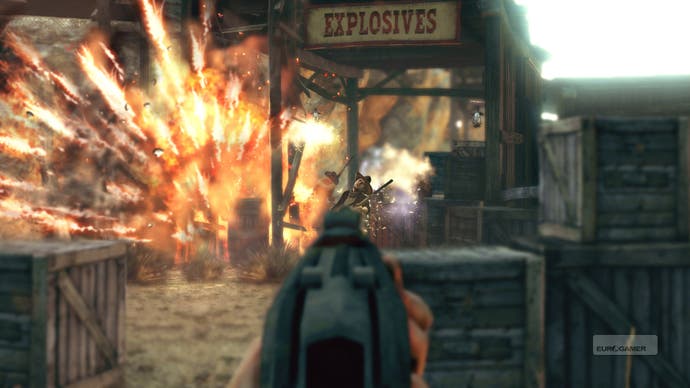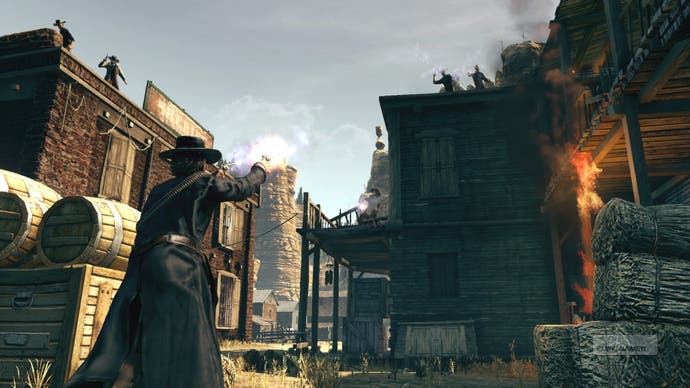Call of Juarez: Bound in Blood
Western decadence.
A number of chapters also enjoy a neat quick-draw contest, when you face off against a famous antagonist. The camera drops to just behind your hip and you steer your gun-slinger in cautious steps to left or right, circling your opponent, and guide your hand towards your holster with the right stick. When a bell rings, slam the right stick in to draw your gun and squeeze the trigger to kill. Not a fun game in itself - you either die or win, instantly - but a tense and superbly evocative bit of interactive cinema. There's also a decent, natural attempt at an FPS cover system that doesn't use any button-presses, just proximity and a slight modification to the way your look works. This works much better vertically than horizontally, though.
The majority of the game is entirely linear, but Techland has dropped a couple of free-roaming interludes into the middle. In each of these, you can explore a fairly wide-open expanse of first Mexico and then Arizona, picking up side-missions for extra cash, and buying new weapons at a gun store. They're a pleasant change of pace but feel very underdeveloped; the wilderness is largely empty, missions are few, and those there are aren't significantly different from the mildly objective-driven slaughter of the main story.
You sense that these episodes are primarily there to give you a moment of quiet to drink in the scenery. And although the dustbowls of Mexico and Arizona aren't the most interesting locations in Call Bound in Blood - those honours going to the misty, rain-soaked backwoods of Georgia and Arkansas early in the game - they are, like every setting in the game, subtly handled, starkly beautiful, and profoundly atmospheric. Techland's evocation of the frighteningly untamed expanse of the Old West, and the seedy desperation of a life spent clinging to it, is second to none in games.

Its storytelling isn't bad, either, although it is mostly quarantined from the endless, crackling gunfights of actual gameplay. Bound in Blood's tale is a little more grounded than the first game's, but has an epic sweep, and handles the filial tensions, the historical context, and the earthy dialogue quite well, managing a few surprises along the way. The cut-scenes are dignified by decent voice acting and let down by awkward animation; more effective, perhaps, are the expressive drawings in between chapters, with voice-overs by the third brother and conscience of the game, seminary student William. Only a weak collapse into novelty-videogame-boss-fight and pat, hurried coda undermines its authenticity.
Finally, it's well worth mentioning the multiplayer, which I wasn't able to test on this review version, but which we had already sampled at a preview event and came away impressed by. As well as adding the lovely scoring concept of "bounty" - a price on your head which mounts with your success as a player - to some fairly standard game-types, Bound in Blood also has objective-driven "Wild West Heroes" contests worked out for every map, which pit teams of lawmen and outlaws against each other, as well as a suite of unlockable character classes, and custom maps replicating famous moments in frontier history. It may not take the FPS multiplayer world by storm, but it's a solid, craftsmanlike effort with a strong sense of what western fans want.

All of which can be said of Call of Juarez: Bound in Blood as a whole. It's far too unvaried and unrelenting a shooting gallery to earn an unhesitating recommendation; although the internal pacing of each chapter is good, they're all the same, and when you find yourself taking potshots at distant, silhouetted, Stetsoned heads 10 seconds into the umpteenth level, your heart can sink. It's a little rough and old-school in some places, but that suits its cantankerous, revisionist mood and down-and-dirty subject matter. But above all, it's a proper western, set in a tangibly real Wild West, with proper, honest-to-goodness cowboys, Indians and bandits in it. Experience tells us that's harder to pull off in videogames than you might think, and it counts for a lot, no matter where it comes from.

